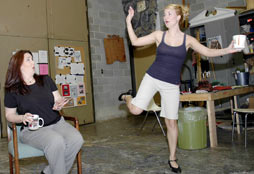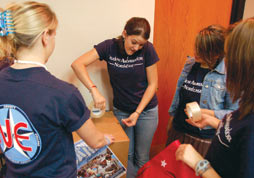By Rylie Parkins/reporter
Loose bowels, sweaty palms and fluttery stomachs may sound like symptoms of some strain of the flu, but in actuality these are common symptoms associated with test anxiety.
Annie Dobbins, South Campus counselor, presented several tips on how to avoid test anxiety by becoming better prepared for tests Oct. 2 as part of the counseling center’s Student Success Seminars.
The seminar was packed with students to learn tips essential to passing any test. Dobbins said the reason one may have test anxiety is a result of being ill-prepared.
“ Testing should become second nature, like tying your shoes,” she said.
Another reason one may be anxious before and during a test is the fear of failure.
Dobbins offered reassurance.
“ Failure is something we do, but it is not who we are,” she said.
This particular quote, referenced many times throughout the seminar, apparently stuck with students, such as Vicky Brooks, a South Campus student.
“ Failure is something I do; it’s not who I am. That is what’s most important,” she said. “I may not pass, but that does not make me a failure.”
Additional tips covered in the seminar addressed test preparation.
“ First and foremost, have a good attitude,” Dobbins said. “Believe you’re capable of doing well.”
One popular study method Dobbins addressed in order to help prepare for a test was the “RRR” which stands for “read, record and recite.”
Dobbins also said students should study material one section at a time in order to prevent overload because the material will be stored only in short-term memory. Dobbins said the most important piece of advice she could give for adequate preparation is to get a good night’s sleep the night before and to eat something before the test.
Dobbins also provided tips on deciphering test questions, explaining the secrets behind answering true/false, multiple-choice, matching, fill-in-the-blank and essay questions.
On true/false questions, test makers incorporate extreme modifiers such as only, nobody, always and never. If any of these words appear in the question, Dobbins said, there’s a good chance the answer to that question will be false.
When answering a multiple-choice question, the phrase all of the above typically indicates a correct answer, while the phrase none of the above frequently indicates an incorrect answer.
At the conclusion of the seminar, students like Teresa Johnson, a South Campus student, provided positive feedback.
“ I learned a lot of helpful information, but mainly, I learned how not to be nervous and how to relax.”
Brooks added, “I learned how to become more comfortable taking tests. I would attend this seminar again to get more out of it.”
“ Even if you’re a person who does well on tests, you should attend the seminar just to pass along information to others who could not attend the seminar,” she said.

























